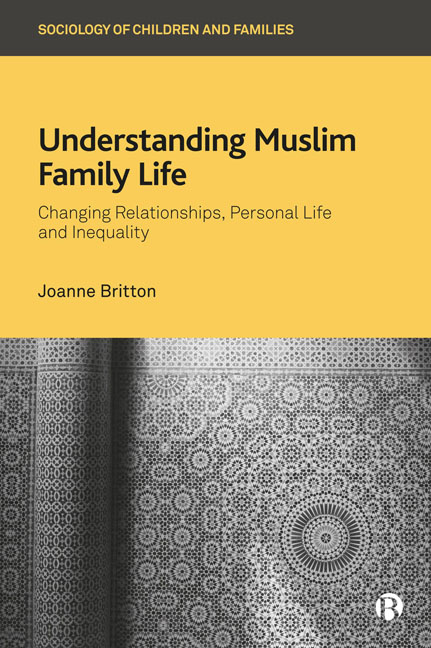Book contents
- Frontmatter
- Contents
- About the Author
- Acknowledgements
- 1 Introduction
- 2 Theorizing Muslim Family Life
- 3 Identity and Belonging: Exploring Intersections
- 4 Changing Perspectives: Muslim Families as ‘a Problem’
- 5 Marriage Practices
- 6 Gender Relations and Diverse Relationship Practices
- 7 Generation and Intergenerational Relations
- 8 Inequality, Disadvantage and Discrimination
- 9 Conclusion
- References
- Index
8 - Inequality, Disadvantage and Discrimination
Published online by Cambridge University Press: 19 December 2024
- Frontmatter
- Contents
- About the Author
- Acknowledgements
- 1 Introduction
- 2 Theorizing Muslim Family Life
- 3 Identity and Belonging: Exploring Intersections
- 4 Changing Perspectives: Muslim Families as ‘a Problem’
- 5 Marriage Practices
- 6 Gender Relations and Diverse Relationship Practices
- 7 Generation and Intergenerational Relations
- 8 Inequality, Disadvantage and Discrimination
- 9 Conclusion
- References
- Index
Summary
This chapter explores evidence of how Muslims experience various forms of inequality, disadvantage and discrimination. In doing so, it considers ways in which race, ethnicity and religion, as multiple axes of differentiation, intersect in complex ways to shape Muslim family life. The chapter begins by assessing government approaches to tackling multiple forms of discrimination against Muslims taking into consideration religion, race and ethnicity. It then moves on to consider the COVID-19 pandemic and its aftermath, assessing how Muslim family life was depicted. It explains how positive relational, emotional and intimate dimensions of family life were foregrounded together with common perspectives of Muslim families as family-oriented, socially conservative and law-abiding. These, however, co-existed alongside familiar problematizing accounts positioning Muslim families as a law-breaking, threatening, self-segregating minority. The chapter presents and reviews a body of evidence to show how the pandemic amplified inequalities experienced by Muslim families, as part of the most disadvantaged communities. It considers a range of factors, including types of employment, multigenerational households and overcrowding, to highlight how the pandemic interacted with and exacerbated pre-existing health and social inequalities.
The chapter then moves on to critically consider Muslim family life in conditions of poverty. This is crucial given the unequal legacy of the pandemic and subsequent, prolonged cost-of-living crisis. It presents a case for the usefulness of a family perspective on poverty. It argues that a relational approach, focused on family living arrangements, practices and relationships, can shed light on how Muslims respond to poverty as a family trouble. In addition, adopting a family perspective on poverty provides another valuable means of critically assessing the robustness of familism and a collectivist orientation to family life.
Government approaches to tackling discrimination against Muslims
There is a notable contradiction at the heart of government approaches to tackling forms of discrimination experienced by Muslims. While successive governments have adopted various measures aimed at tackling discrimination on the grounds of race, ethnicity and religion, they have also been complicit in enacting policies and programmes that are widely considered discriminatory.
- Type
- Chapter
- Information
- Understanding Muslim Family LifeChanging Relationships, Personal Life and Inequality, pp. 117 - 136Publisher: Bristol University PressPrint publication year: 2024

